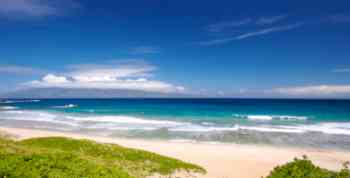Hawaii is more than just an archipelagic state. It has the world’s best islands, recognized by studies and travel surveys. It is a dream place for retirees who wish nothing more than to spend their twilight years in a tropical paradise. So why would you want to spend your retirement anywhere else when Hawaii offers ‘literally’ the best?
Yes, even the best also has its drawbacks. However, when it comes to Hawaii real estate, the benefits and advantages outweigh the minor humps you go through. Although we know there’s nowhere else you should retire than Hawaii; it’s better that you decide after weighing your options and the pros and cons. It’s a must for you to think of these drawbacks before investing in a retirement condo or luxury real estate.
In addition to Hawaii’s majestic mountains, tranquil beaches, balmy temperatures, gushing waterfalls, and breathtaking sunsets, know more of the pros and cons of retirees moving to Hawaii you ought to consider before moving to the Aloha state.
Retire to Hawaii Pros
Access to quality healthcare
Hawaii consists of a chain of islands, so you might think the healthcare there is the worst. However, you’ll be pleased to know that Hawaii ranks first in health care access and quality in the US. Even the average health cost is way below the national average.
Together with Hawaii’s ideal scenery and climate, these reflect Hawaii’s high rank in United Health Foundation’s Senior Health Report.
Safe neighborhoods
Retirees shouldn’t worry too much about safety. After all, that was the primary concern pre-retirement. Hawaii consistently ranks among the safest US states. It has low crime rates, thanks to Hawaii’s effective law enforcement.
The island only records 2.5 offenses per 1000 residents — far lower than the national average. Such will guarantee you a restful night’s sleep at your beachfront real estate without being anxious about robbers breaking.
Friendly neighborhood
Choosing Hawaii for retirement typically requires leaving your family behind in the big city. Take heart, though, because Hawaii has the warmest and friendliest neighborhoods. Thus, inviting your family over won’t be a problem. They say it’s the Aloha nature — a Hawaiian culture you will grow to love and enjoy.
The island state has a strong sense of community, so residents extend familial warmth to their neighbors. Through this, you make friends quickly that feel like family.
Tax advantage for retirees
While it’s true that Hawaii isn’t generally tax-friendly, there are a few ones that specifically benefit retirees. The value of luxury real estate in Hawaii may be high, but property taxes there are the lowest in the US. Seniors can also apply for home exemption programs that reduce assessed property value.
Additionally, if you qualify as someone who receives government pensions, that income isn’t taxable in Hawaii. This exemption also applies to employer-funded pension plans or retirement benefits.
Casual Living
After years of living a fast-paced life, Hawaii lets you experience slow living. It’s time you ditch the suits or high heels and enjoy your days in your most comfortable clothes or overalls. Take control of your timeline: pause and appreciate life’s marvels. Relax, walk on the beach, read a good book outside your West Maui property, or be adventurous if you feel like it.
This is where the beauty of Hawaii retirement lies — casual, laid-back living. After all, it’s not named the happiest and healthiest state for nothing.
Investing in Hawaii’s luxury real estate for retirement
As home to some of the most luxurious and exclusive estates in Hawaii, West Maui is the perfect place to settle into after you retire. West Maui’s luxury estates offer breathtaking ocean views, private pools, and all the amenities you could ever want, so every day is sure to feel like a vacation. Investing in a luxury Hawaii estate is an investment in your future happiness. And with its stunning natural beauty and endless offerings, West Maui is the perfect place to retire in style.
Cons of Retiring to Hawaii
High cost of living
Hawaii retirement is a dream but not an easy feat to achieve. You and your retirement fund need to come prepared. Total annual expenditures cost roughly $100,000, with $31,000 going to housing costs and around $11,000 for groceries and transportation.
Living comfortably in Hawaii for ten years costs at least $1 million. It’s the most expensive state for living in the US. However, it’s a worthy bargain because the state has the highest life expectancy at 86.5 years.
Transportation might be challenging
Pro tip: Ship your car to Hawaii. You will need it more than you’ll realize because the island lacks public transit options. There are no trains, trams, or subways other than the bus systems in the Big Island, Oahu, Maui, and Kauai.
Taxis and Uber are available on the major islands, but they are expensive. Traffic can be terrible because most roads have only two lanes. Having your car or renting one is your most convenient option to go around the island.
Environmental risks
Hawaii might be a paradise, but it’s not always rainbows and bursts of sunshine. Being surrounded by nature also has its drawbacks. Wildlife within your reach also means sharks and insects around. The beach as your backyard is dreamy, but it poses risks during hurricanes and tropical storms.
Furthermore, volcanoes surround Hawaii. Kilauea, its most active volcano, recently erupted last September 2021. There will be potential lava flows. However, worry less because authorities give warnings in advance to guarantee everyone’s safety.
Tax disadvantage
Again, Hawaii, in general, isn’t tax-friendly. For instance, the state charges tax on private pensions and retirement savings accounts, like 401(k) or IRA. Hawaii also has a general excise tax instead of a sales tax. Because of that, Hawaii is one of the states with the highest sales tax rate.
Homes are expensive, too, primarily luxury real estate. However, if you’ve worked long and hard enough pre-retirement, you deserve to enjoy a luxurious retirement home in Hawaii.
Moving with pets is not easy
Bringing your family with you to retirement is unlikely, so you’ll bring your favorite pet instead. Unfortunately, the Hawaiian government requires a lengthy and costly screening process for non-native animals, such as your pets. This process protects the island’s ecosystem against invasive plant species and potentially disease-carrying animals.
Unless you’re willing to go through the process and the required quarantine, your pet will make it with you to Hawaii.
If you think the pros outweigh the cons, retiring in Hawaii is for you. Hawaii’s calm and adventurous side will repay you more than your investment’s worth.





